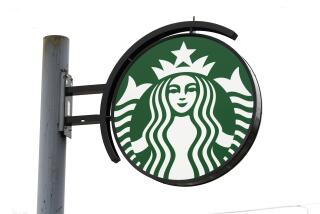Firms Boost Security Ahead of War
- Share via
U.S. corporate icons such as Starbucks Corp., Coca-Cola Co. and McDonald’s Corp. are stepping up security ahead of a likely war in Iraq that could stoke anti-American sentiment worldwide and unleash violence against businesses.
U.S. multinationals, which generate substantial revenues overseas, are boosting plant security, adding armed guards, increasing staff training and instituting background checks on job applicants and even workers such as cashiers and drivers, security experts said.
“If you hate America, it’s real easy to hate Coke or McDonald’s,” said Lawrence McNaughton, who heads CoreBrand, a Connecticut-based brand consulting firm. “The two primary criteria for determining risk,” he said, would be “if you’re in business in the Middle East and you’re a cultural icon.”
Security experts said the most vulnerable sector may be the fast-food industry, led by hamburger giant McDonald’s, whose 30,000 worldwide stores with their distinctive golden arches are one of the most recognized symbols of U.S. culture.
The company has a substantial presence in the Middle East.
Increased hostility already has led to a few attacks on businesses linked to the United States in the Middle East, boycotts of American products and security alerts at U.S. corporate offices in the region.
Saudi Arabian youths have firebombed two McDonald’s in the kingdom since November. The homemade bombs caused limited damage but intensified fears among Westerners, who have been the targets of several other attacks.
At least five American-style fast-food restaurants in Lebanon, including two Pizza Hut branches and a KFC chicken outlet, have been rocked by bomb attacks since May.
In Cairo, a recent bomb threat telephoned to Citibank, part of Citigroup Inc., led to the evacuation of a large building off a central square where the offices of several foreign companies are located, including Microsoft Corp. and Hewlett-Packard Co.
Consumers in several Middle Eastern countries are shunning American goods, and Iran has banned media advertising for all U.S.-made goods.
The outcry against President Bush’s policy toward Iraq has extended to massive protests in Europe. In Britain, Greenpeace volunteers recently raided Esso gas stations and shut off electricity to send an antiwar message to Esso parent Exxon Mobil Corp.
None of the companies contacted would discuss the details of their security plans, although several said they were taking steps to cope with a possible backlash.
“The Middle East is an important region for Starbucks and we are concerned about the tense political climate,” said Audrey Lincoff, a spokeswoman for the Seattle-based operator of coffee shops.
Atlanta-based Coca-Cola has moved some of its regional management team to Greece from the Persian Gulf state of Bahrain, a company executive in the Middle East said. Although Coke declined to link the move to heightened tensions, anger at the United States is running high in Bahrain, where U.S. flags were burned at demonstrations Friday.
Michael Cherkasky, chief executive of global security consulting firm Kroll Inc., said companies are spending substantial amounts of money on security, including “putting in more cameras, narrowing the access, setting off the approachability of cars to buildings.”
More to Read
Inside the business of entertainment
The Wide Shot brings you news, analysis and insights on everything from streaming wars to production — and what it all means for the future.
You may occasionally receive promotional content from the Los Angeles Times.










